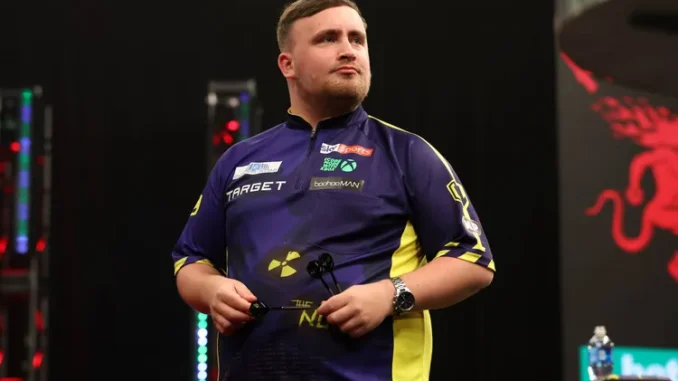
At just 18 years old, Luke Littler has already cemented his place as a darts prodigy, captivating fans and rewriting the sport’s history books. The young Englishman, affectionately dubbed “The Nuke,” has taken the darts world by storm with his meteoric rise, culminating in his crowning as the PDC World Champion. His remarkable achievements, including multiple major titles in a short span, have sparked inevitable comparisons to the sport’s greatest icon, Phil “The Power” Taylor, who boasts an unparalleled 16 world titles. However, according to darts veteran Adrian Lewis, there’s one critical quality Littler must embrace to truly challenge Taylor’s towering legacy: an unrelenting, almost selfish drive to dominate.
Littler’s ascent has been nothing short of extraordinary. Bursting onto the scene as a teenager, he has already clinched six major titles, including the prestigious World Matchplay, where he defeated James Wade 18-15 in a thrilling final. His tournament average of 105 at the Winter Gardens placed him among the all-time greats, a testament to his raw talent and composure under pressure. At such a young age, Littler’s ability to compete with seasoned professionals like Michael van Gerwen and Luke Humphries has drawn admiration and sparked debates about whether he could surpass the records set by legends like Taylor, Eric Bristow, and van Gerwen. Yet, Lewis, a two-time world champion and former protégé of Taylor, believes that talent alone won’t be enough to eclipse “The Power.”
Lewis, speaking with conviction, emphasized that Littler must cultivate a “greedy” mindset to cement his place among darts’ elite. “He has to be selfish on the oche and not let anybody else get in on the act of lifting silverware,” Lewis remarked. This hunger for victory, he argues, is what defined Taylor’s unparalleled career, during which he dominated the sport for over two decades with a relentless will to win. For Littler to match or exceed Taylor’s 16 world titles—a feat that seems almost mythical—Lewis insists he must maintain the same fierce determination that has already propelled him to global stardom. “I really do think he has the potential longevity,” Lewis added, acknowledging Littler’s youth and skill as key advantages in his quest.
The challenge, however, is daunting. Taylor’s record is not just a number; it represents years of dedication, countless finals, and an ability to perform consistently under the grueling demands of professional darts. Littler himself is aware of the magnitude of the task. After his World Matchplay triumph, he spoke of the need to adapt to different competitions and mindsets, saying, “I got tested in Blackpool, and I definitely made a good 10 days of it. Happy to come out with the win and claim the Triple Crown, but now we’re Down Under, it’s a different competition.” His ability to stay focused amid a packed PDC calendar, filled with tournaments like the upcoming New Zealand Masters, where he faces Haupai Puha in the first round, will be crucial.
Littler’s impact extends beyond the oche. His emergence has ignited a surge in darts’ popularity, drawing younger audiences and inspiring a new generation of players. The teenager’s charisma and relatability—evident in his emotional response to receiving a congratulatory message from David Beckham after his world title win—have made him a cultural phenomenon. Yet, the pressure of being the sport’s poster child could pose a challenge. Lewis warns that Littler must remain disciplined, avoiding distractions and maintaining the hunger that has already earned him over £1.5 million in prize money. “It’s a long time, but now we are here, and coming off the back of the Matchplay win, I am feeling very confident,” Littler said, exuding the self-belief that could carry him far.
The darts community is divided on whether Littler can surpass Taylor’s legacy. Some, like former pro Andy Cornwall, boldly claim that Littler might already be on track to outshine Taylor, citing his superior tournament averages and the modern game’s improved equipment. Others, like Dennis Priestley, argue that Taylor’s era was uniquely challenging, making his records untouchable. Regardless, Littler’s youth gives him a significant head start—Taylor was 29 when he won his first world title, while Littler has already claimed one at 18. With potentially decades ahead, the question is not just about talent but endurance, discipline, and that “greedy” edge Lewis describes.
As Littler prepares for his next challenge in New Zealand, the darts world watches eagerly. His journey to rival Taylor’s legacy is just beginning, but with his skill, mental fortitude, and a touch of ruthlessness, “The Nuke” might just detonate the record books and redefine darts greatness.
Leave a Reply